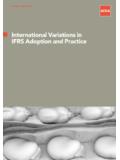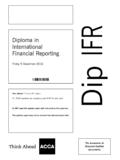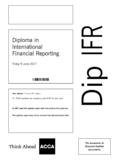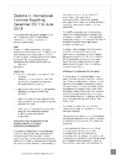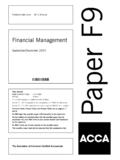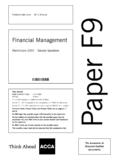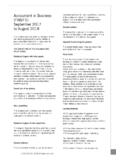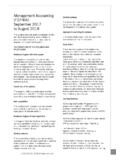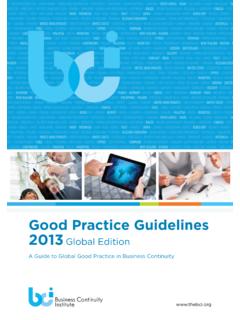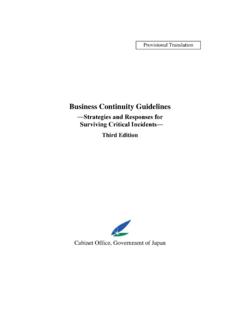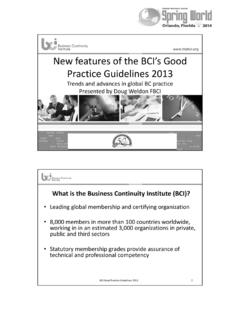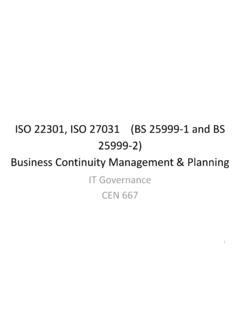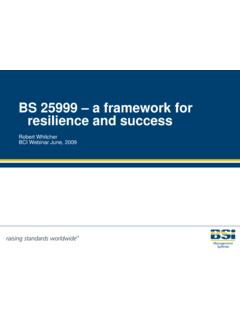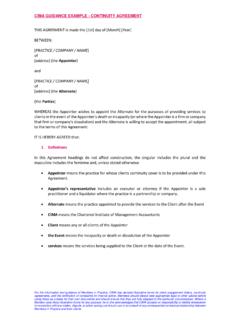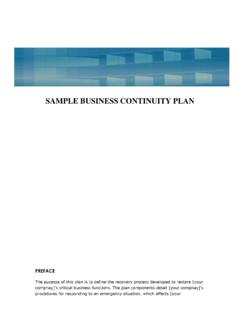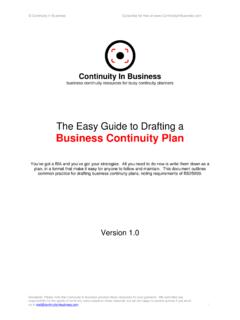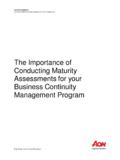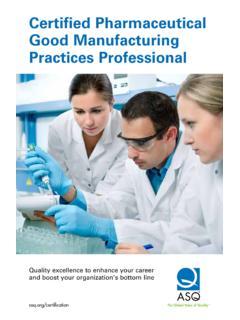Transcription of Continuity of practice requirements - ACCA Global
1 The Chartered Certified Accountants Global Practising Regulations 2003 (GPRs) set out the eligibility criteria for obtaining ACCA certificates and licences and detail the continuing obligations placed on certificate/licence holders. The Continuity of practice requirements are contained in GPR 11, and the corresponding Annexes to the GPRs, and in section B10 of the Code of Ethics and Conduct. Continuity of practice requirementsThis factsheet has no regulatory status. It is issued for guidance purposes only, and in the event of any conflict between the content of this factsheet and the content of the ACCA Rulebook, the latter shall at all times take precedence. Therefore, this factsheet should not be regarded by a member as a substitute for familiarising himself or herself with the appropriate regulations or, where necessary, obtaining specific advice concerning a specific requires all practitioners and regulated firms to make arrangements so that the professional needs of their clients will be dealt with if the practitioner dies or becomes incapacitated through illness.
2 It is mandatory that a written agreement be made, and this may be inspected by OF PRACTISING CERTIFICATESA sole practitioner must enter into an agreement with a practising accountant or a firm (whether incorporated or in the form of a partnership) of practising accountants whose practice is based in the same country. (Practitioners can appoint more than one Continuity provider.) Practitioners must ensure that their Continuity nominees hold the same levels of authorisations as they do. In the UK/Irish context, a sole practitioner who is a statutory auditor should ensure that their Continuity nominee holds this those in partnership, the arrangement may be made either within the partnership agreement or by entering into an agreement with another firm.
3 An incorporated firm must make provision for Continuity either within its articles of association or by entering into an agreement with another firm. The same considerations with respect to authorisations, as detailed above for sole practitioners, apply to firms. Where a member practises in more than one country, they must make separate Continuity arrangements in each of those OF INSOLVENCY LICENCESA sole practitioner insolvency licence holder must make their Continuity arrangements by entering into an agreement with another sole practitioner or firm based in the same country. At least one of the partners in the nominated firm must be a licensed insolvency those in partnership, the arrangement may be made within the partnership agreement, providing the partnership contains at least one other licensed insolvency practitioner, or by entering into an agreement with another firm of practising accountants containing at least one licensed insolvency practitioner.
4 An incorporated firm must make provision for Continuity either within its articles of association, providing the firm contains at least one other licensed insolvency practitioner, or by entering into an agreement with another firm containing at least one licensed insolvency UNDERTAKING INVESTMENT BUSINESSA sole practitioner s firm in the UK carrying out exempt regulated activities must make Continuity arrangements with another firm. A Continuity arrangement with another ACCA regulated firm will be sufficient in all cases. Where the Continuity arrangement is made with a firm regulated by another Designated Professional Body, firms must ensure that the Continuity nominee is able to conduct investment business and incorporated firms eligible to conduct exempt regulated activities may make Continuity arrangements within the partnership agreement/articles of association or with another firm that is eligible to conduct exempt regulated a sole practitioner, partnership or incorporated firm is authorised by the FSA to conduct regulated activities, the Continuity nominee must hold at least the equivalent authorisation from the holding investment business certificates (Ireland)
5 Must make arrangements either in the partnership agreement/articles of association or with another firm authorised under the Investment Intermediaries Act A Continuity NOMINEEWhen choosing a sole practitioner or firm with which to enter into a Continuity agreement, a practitioner should try to find a compatible practice where procedures, fee structures and the work types undertaken are of a similar nature. Practical considerations such as location, staff availability, technical skills and client characteristics should also be taken into is essential that firms appointed as Continuity nominees are made aware of the practices and procedures of the firms with which they have entered into Continuity agreements so that, in the event that a nominee is called upon to act, the firm will be more effective in its role at an earlier stage.
6 It is recommended that practitioners and their nominees meet, not only when first setting up the agreement, but also at periodic intervals (for example, as part of firms internal annual reviews) to exchange information about the are recommended to review their Continuity arrangements over time to consider if they continue to be appropriate. For example, a firm which has expanded its business, or which has developed particular specialisms, may, on reflection, determine that it would be prudent to seek Continuity with another firm which has greater capacity or which has similar specialist A WILLE very practitioner is strongly recommended to make a will and appoint executors who will be able to administer the estate. It may be advantageous if one of the executors is professionally qualified.
7 Executors of an estate can act at once to protect a practice . If, however, a practitioner should die intestate, the administrators will have no authority to act until they have obtained a Grant of Letters of Administration. The resulting delay may lead to the practitioner s affairs, and those of their clients, not being properly controlled and managed. Practitioners are recommended to inform their executors and family of the existence and purpose of their Continuity agreement, and to inform them of the location in which the agreement is stored. In the event of a practitioner s death or incapacity, the personal representatives will be able to locate the document quickly and, having read it, will be able to identify the wishes of the practitioner with respect to their A Continuity AGREEMENTACCA requires all Continuity agreements and management agreements to be evidenced in writing.
8 Any agreement drawn up must comply with the current ACCA Regulations. Members should note that an exchange of letters between practitioners would meet ACCA s requirements . Such letters should be on the respective practitioners headed business stationery and signed by the following notes have been prepared to assist members in drafting their own Continuity agreements. The text comments upon those matters which members must include within their Continuity agreements and also suggests further matters that practitioners may wish to THAT MUST BE DEALT WITH BY THE Continuity AGREEMENTThe Continuity agreement must include clauses that deal with the following matters: the precise nature of the legal relationship between the practitioner and the Continuity nominee the circumstances which will cause the management arrangement under the Continuity agreement to commence operating a statement of the maximum duration of the management of the practice under the Continuity agreement provisions for the review of the arrangements should circumstances warrant an extension of time the Continuity nominee s obligations the Continuity nominee s powers relating to such matters as the administration of the practice .
9 Engagement and dismissal of staff and operating bank accounts the basis on which the Continuity nominee will be remunerated the letter to be sent to clients in the event of the practitioner s death or THAT WILL CAUSE THE MANAGEMENT ARRANGEMENT UNDER THE Continuity AGREEMENT TO COMMENCEThe practitioner and nominee are recommended to discuss, agree and document a set of procedures that are to be implemented in the event of the practitioner s incapacity or death. Frequently, the Continuity agreement has to be actioned at a time of great personal stress and general confusion. The practitioner s personal representatives are likely to find a structured, agreed set of procedures, and a record of the practitioner s wishes with respect to their practice , of great assistance at such a difficult will not always be possible for the practitioner to notify the nominee in person that the Continuity arrangement should be activated.
10 Parties may wish to identify a number of persons (eg practitioner, spouse, executors, personal representatives, solicitor, etc) within the agreement who may deliver documents and notices to the to the agreement are recommended to discuss and agree what, if any, proof they require of incapacity or death. For example, in the event of incapacity, the delivery to the nominee by the practitioner/representatives of a medical certificate from a properly qualified medical practitioner may be thought necessary. The parties may also agree that certain matters should be confirmed by the medical practitioner for example, that in the medical practitioner s opinion, the practitioner is physically and/or mentally unfit, through illness, accident or otherwise, effectively to manage their practice and, in the said medical practitioner s opinion, is likely to be so incapacitated for a period of not less than x the practitioner should die, then matters may be more complex than when the practitioner is incapacitated.
